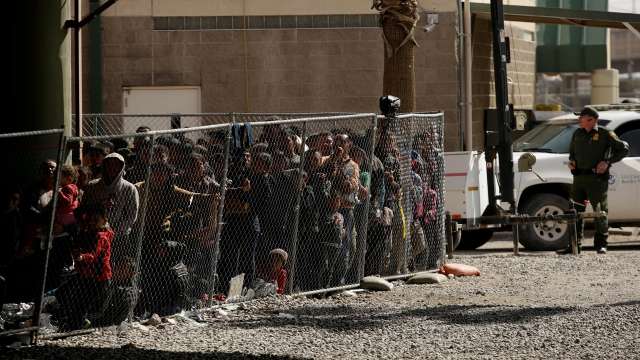North America
Migrants held in El Paso, Texas, enclosure as surge overwhelms city

Hundreds of migrants are being held in a chain-link enclosure in El Paso, Texas as the number of families crossing the U.S.-Mexico border in the city overwhelms U.S. Border Patrol facilities, the agency said on Thursday. The enclosure holds migrants crossing the border illegally in metropolitan El Paso as they wait to be processed at a nearby Border Patrol station, U.S. Border Patrol Agent Ramiro Cordero said by phone.
How long they remain in the enclosure, set up late last month below the city’s Paso del Norte International Bridge to Ciudad Juarez, Mexico, depends on how many migrants cross the border, he said.Right now, they are crossing at an average of 570 people per day in that area.
“It could be a couple of hours, it could be more than that, it could be overnight, I can’t tell you, it’s just too many people for me to tell you an exact time or time frame,” Cordero said.
The enclosure was put up to help Border Patrol cope with a surge in mainly Central American asylum seekers that U.S. Customs and Border Protection (CBP) has been predicting for “some time,” agency head Kevin McAleenan said at an El Paso press briefing on Wednesday.
Migrants at the “transition center” are given silver thermal blankets and can get shelter, food, water and a medical evaluation, officials said. A Reuters photographer saw children sleeping outside in the enclosed area on Sunday night when the low was around 47 degrees Fahrenheit (8 degrees Celsius).
More than 1,000 migrants were arrested in the El Paso sector on Monday, bringing the total number in CBP custody – including the enclosure – to almost 3,500 Wednesday. The migrants are in facilities built for far fewer people and designed for single adults who once formed the bulk of arrests, McAleenan said.
Families and children now form the majority of apprehensions across the Southwest border, with a record 55,000 family units apprehended or encountered in March, McAleenan said. McAleenan said “soft-sided buildings” with walls of canvass and plastic would provide a stop-gap measure to house migrant families before a planned $192 million processing facility is built in the city. But those buildings have yet to be put up, according to the Border Patrol’s Cordero.
El Paso migrant shelters are receiving around 700 people a day from immigration authorities, compared with a previous high of 2,000 a week (less than 300 a day) in late 2018, said Dylan Corbett, director of El Paso’s Hope Border Institute which advocates for migrant rights.
“It’s not sustainable right now, that’s why everyone is really nervous, because this just can’t last,” said Corbett by phone.




























